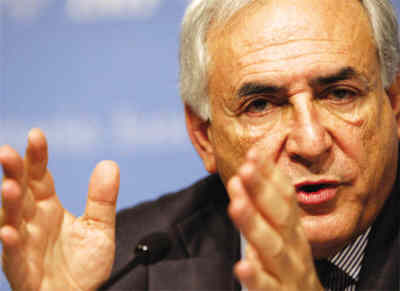IMF board approves landmark reforms
|
|
|
Dominique Strauss-Kahn, Managing Director of IMF |
The Board of Executive Directors of the International Monetary Fund (IMF) has approved historic reforms, including shifting quota or voting power from advanced economies to "dynamic" emerging and developing countries, IMF chief said on Friday.
"The reforms have been fully adopted by the board," Dominique Strauss-Kahn told a press conference in Washington. After this reform, China will become the third biggest member in the Washington-based international organization.
"This historic agreement is the most fundamental governance overhaul in the Fund's 65-year history and the biggest ever shift of influence in favor of emerging market and developing countries to recognize their growing role in the global economy," Strauss-Kahn said after the Executive Board's decision.
As part of the far-reaching reforms, more than 6 percent of quota shares will be shifted to dynamic emerging market and developing countries, while protecting the quota shares and voting power of the poorest members. The Board also endorsed proposals that would lead to a more representative, all-elected Executive Board.
The move also lifts large emerging powers -- India, Brazil and Russia -- into the top 10 ranks of the 187-member institution.
The Executive Board, which oversees the Fund's day-to-day operations, recommended the reform package to the Board of Governors, which represents all 187 members and must approve the proposed reforms.
Following the Board of Governors' approval, the proposed quota increases and the amendment will have to be accepted by the membership, which in many cases involves parliamentary approval, and which members will make best efforts to complete by the IMF's annual meetings in 2012.
Strauss-Kahn said that the IMF reform has taken a lot of energy and time in the past year. "I am very happy that it has been solved."
 0
0 







